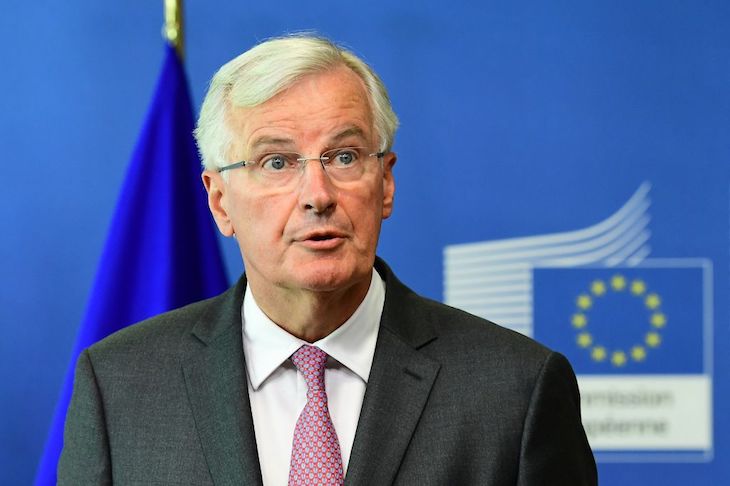There is a growing perception that Britain is floundering in its EU negotiations, with a professional team from Brussels running rings around our bumbling amateurs. It is an idea that is being put about by the EU’s chief negotiator, Michel Barnier, who this week appealed for Britain to begin ‘negotiating seriously’. As he has found out, the strange dynamic of British public debate at present means that EU spin is repeated uncritically by those hostile to Brexit. It can seem, at times, as if we are in the grip of hysteria normally seen during the final days of an election campaign.
This is not to say that the British side has been faultless. The government has struggled to articulate the clear case for Brexit that we heard during the Leave campaign. It also seems to be repeating David Cameron’s pre-referendum mistake of assuming that a good deal is inevitable. The Prime Minister has said that ‘no deal is better than a bad deal’ but no longer seems to believe it. Her argument is that the European countries have as much to gain from a free-trade deal as Britain does — but we are not negotiating with those countries. We’re talking to a dysfunctional EU apparatus, and a team of negotiators that has never succeeded in agreeing a deal with one of Europe’s top five trading partners.
As M. Barnier says, time is passing quickly. So the British government must go over the heads of Barnier and his team and start appealing directly to the governments, people and commercial interests of other EU nations. As many governments recognise, there should be no practical obstacles to Britain establishing a post–Brexit trade deal with the EU. We are starting from a straightforward position of free trade. Inevitably, there will be some sticking points — the main one is bound to be agricultural goods. Given the EU’s instinctive protectionism, it will be tricky to see how British farmers can continue to enjoy access to EU markets while Britain and the EU develop very different policies to food imports from Asia, Africa and South America.
Yet progress on these issues could already be well under way were it not for the obstructive approach being taken by Barnier and his team. They have at least been consistent: at the beginning of the negotiations they said they would refuse to discuss trade until Britain had agreed to pay a substantial leaving bill. Ever since, they have stuck to that line, with the result that trade talks have not even begun. In Barnier’s fantasy world, this delay is hurting Britain alone. When he talks of ‘a clock ticking’, it is as if a trade deal would be of benefit only to Britain, a kindly offer from the EU which we are in danger of losing out on.
If anything, given the UK’s trade gap with the rest of the EU, it is Europe which stands to suffer more if trade barriers are erected across the Channel. Last year, British exporters sold £240 billion-worth of goods and services to other EU countries, while they sold £310 billion-worth to us.
The weakness of Barnier’s position is that commercial interests within the EU know full well what is at stake and they are not going to tolerate his obstinacy for ever. There will come a time when individual member states begin to question whether he is engaged in a purely political battle, one in which he is prepared to harm EU industries to score a perceived moral victory over the UK.
Already there are some signs of this. Last month, the Hungarian trade minister Peter Szijjarto warned that Britain could emerge stronger than the EU in the event of a failed Brexit deal — he pointed out that in spite of its claim to be a champion of free trade, the EU has no deal with the US or China, the world’s two largest economies, nor with India, now the world’s fastest-growing large economy.
The French government, too, seems to be growing weary of Barnier’s blocking tactics. It has proposed a compromise in which demands for Britain to pay a ‘leaving bill’ of €100 billion would be dropped in return for us agreeing to continue paying our annual £10 billion contribution for a transitional period of three years. That would allow trade talks to commence, but Barnier and his team have rebuffed the idea.
To succeed in these negotiations, David Davis and his team are going to have to call Barnier’s bluff. First, they must prepare and publish a proper plan for what to do in the event of a failure to agree a deal with the EU. Cameron’s failure to do so before the referendum showed the EU’s negotiators that he was not serious, and that would accept whatever crumbs they offered. Theresa May’s government must not repeat this error.
Barnier’s posturing shows up one of the EU’s fundamental flaws and why so many in Britain voted to leave. But this flags up a risk that there might not be a deal in prospect at all, because the EU is structurally incapable of negotiating one. And what then? The government ought to have a good answer.






Comments